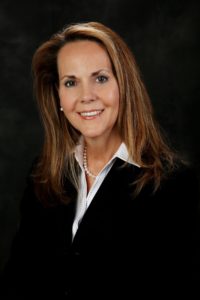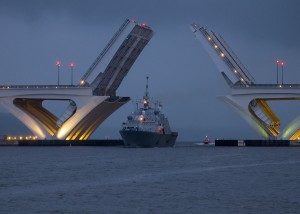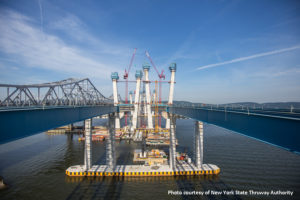 One cannot overstate the importance of the Pittsburgh Airport Corridor and the value of the Pittsburgh Airport Area Chamber of Commerce to regional economic develop and relationship building with the community, including local military partners. Companies and organizations large and small contribute time, resources, and investment in working with PAACC to ensure the corridor remains a critical gateway to the rest of the world. One of these companies, HRV Conformance Verification Associates, Inc. (HRV), located in Moon Township, Pennsylvania, has been a mainstay in the region for over 15 years. H. Rochelle Stachel, the company’s Founder and president has built a vast network of professional peers and contacts throughout the region in support of its continued growth and prosperity into the future.
One cannot overstate the importance of the Pittsburgh Airport Corridor and the value of the Pittsburgh Airport Area Chamber of Commerce to regional economic develop and relationship building with the community, including local military partners. Companies and organizations large and small contribute time, resources, and investment in working with PAACC to ensure the corridor remains a critical gateway to the rest of the world. One of these companies, HRV Conformance Verification Associates, Inc. (HRV), located in Moon Township, Pennsylvania, has been a mainstay in the region for over 15 years. H. Rochelle Stachel, the company’s Founder and president has built a vast network of professional peers and contacts throughout the region in support of its continued growth and prosperity into the future.
“When I think back to 2003 when we started HRV in the basement of my home, with two employees, it seems a bit surreal to see how we have grown and solidified a leadership position in our industry,” said Rochelle. “The most significant aspect of our growth, however, continues to be our involvement and contributions to the local region.”
HRV is a premiere provider of materials quality assurance inspection, which includes steel, concrete, and coatings used in the construction of infrastructure such as roads and bridges, rail and transit, water, and commercial and government buildings nationwide. With a fluctuating seasonal staff of between 100-150 field inspectors, HRV also performs construction management and construction inspection (CM/CI) for state departments of transportation.
 HRV received a huge kick-start early in its project history by providing steel, concrete, coatings and mechanical inspection services for the $1.25 billion Woodrow Wilson Bridge (shown right), a bascule bridge located on the Potomac River in Alexandria, Virginia.
HRV received a huge kick-start early in its project history by providing steel, concrete, coatings and mechanical inspection services for the $1.25 billion Woodrow Wilson Bridge (shown right), a bascule bridge located on the Potomac River in Alexandria, Virginia.
“Successful completion of the Woodrow Wilson Bridge project was significant for us,” added Rochelle. “It proved that HRV was ready to go to the next level and compete for some of the largest transportation infrastructure projects in the country.”
The project also helped to propel HRV into the Pittsburgh regional spotlight for shop and field QA inspection services.
“We began generating quite a reputation and resume with regional projects,” said Rochelle. “Our market mix began to evolve as well with projects in water/wastewater, transit, oil & gas, and sports & entertainment.”
The client list is long, but featured assignments came from Alcosan, Pittsburgh International Airport, PennDOT, Pennsylvania Turnpike Commission, and the Pittsburgh Sports & Exhibition Authority.
“Performing on signature projects throughout the region such as the Southern Beltway, many of the Pittsburgh bridges, the PPG Paints Arena, and PNC Park firmly established HRV as the ‘go-to’ QA inspection firm,” continued Rochelle. “That strong performance history has led to many more regional and national opportunities.”

The $4 billion Tappan Zee Bridge Replacement (shown left) and the $1.5 billion Goethals Bridge Replacement are a couple of the more recent prominent projects HRV has performed services on because of the firm’s strong resume and technical expertise.
“As a small Woman-Owned Business Enterprise (WBE/DBE), HRV strategically positioned itself to compete against much larger organizations and win these two nationally significant Public/Private Partnership (P3), design-build (D-B) projects,” added Rochelle. “In an extremely short period, we delivered 75 qualified field staff in various areas of technical expertise.”
Growth continued as HRV expanded its service offerings to include CM/CI, Non-Destructive Testing (NDT), training, and consulting. The company boasts technical expertise in all these areas, including many highly certified staff that contribute to industry standards and specifications.
More recently, like other companies, HRV has faced the challenges of the COVID 19 pandemic. As an early adopter of CDC-recommended pandemic protocols, HRV developed an operating plan that included working remotely for office staff and providing guidelines and necessary protection for its “frontline heroes”—its field inspection staff.
“From the beginning, we foresaw the trajectory of the pandemic and the potential effects it could have on our business,” said Rochelle. “Our formal safety committee and executive management team formed a task force focused on developing accurate, effective guidelines and implementing the operating plan, which had to be ‘liquid’ based on the ever-changing CDC guidelines.”
The effort paid off as there has been minimal impact to the firm’s staff. In fact, several clients asked HRV to develop similar emergency pandemic response plans for their operations.
“Clients asking us to develop pandemic plans for them was unexpected,” continued Rochelle. “Considering that HRV acts as a representative to its clients in the fabrication shops and construction sites on which we work, we perceived the service as a value-add extension of what we typically deliver.”
Now, HRV is honing its “new normal” way of operating its business and serving its clients. Everything from performing business development and maintaining client relationships to how we staffed the office and conducted meetings has changed dramatically since the start of the pandemic.
“Our response to a ‘new normal’ is always forward-looking,” said Rochelle. “We’ve taken advantage of what could have been a negative impact to our business and implemented operating standards that leverage technology in communicating internally and with clients, while assigning quality task groups to identify and resolve opportunities for process improvement—it’s been an effective way to move the business forward and maintain a competitive advantage.”
Standing still is obviously not in HRV’s DNA as challenges become opportunities for expanding services and adding greater value to its solid client base.
“Of course, we are constantly pursuing the next “Tappan Zee Bridge” project,” added Rochelle. “Construction projects will come back strong as a result of passage of an effective infrastructure funding bill—we are positioning to be there when these mega-projects return.”
The company is also positioning to take advantage of developing technology specific to its QA industry.
 “We are also pursuing early adoption of new technologies such as Augmented Reality (AR), Virtual Reality (VR) and Mixed Reality (MR) methods that will further enhance our already robust service lines.” said Rochelle. “We have recently been invited to participate in an AR pilot project that will potentially change how we deliver our traditional inspection services.”
“We are also pursuing early adoption of new technologies such as Augmented Reality (AR), Virtual Reality (VR) and Mixed Reality (MR) methods that will further enhance our already robust service lines.” said Rochelle. “We have recently been invited to participate in an AR pilot project that will potentially change how we deliver our traditional inspection services.”
With an appreciation for past successes, HRV’s path forward is an ever-changing adaptation to market and social conditions, funding, and technology—no doubt, its visionary Founder will lead the charge ahead.
